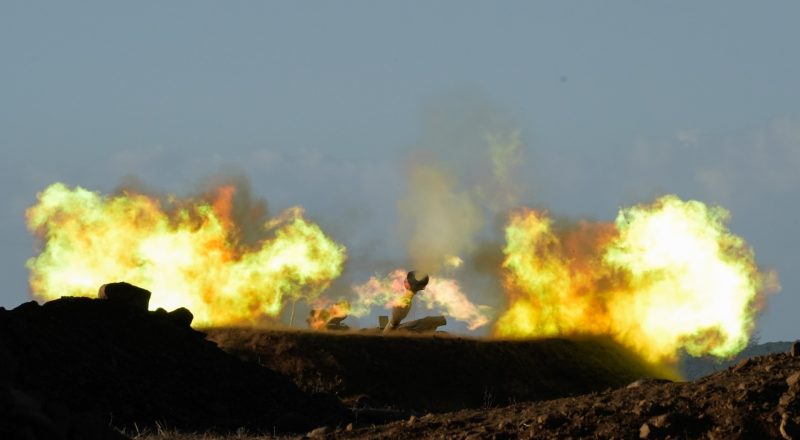ISRAEL is planning to strike Iran’s oil fields in response to Tehran’s ballistic missile attack amid boiling tensions between the two archenemies.
Israeli PM Netanyahu vowed to retaliate against Iran after it unleashed a barrage of 180 missiles in a major escalation triggering fears of a Middle East all-out war.
Netanyahu’s response to Iran’s blitz could target oil production facilities inside Iran within days, Israeli officials told Axios.
Other possible targets would be the country’s air defence system as well as assassinations of senior figures.
After Tuesday’s attack, Netanyahu said Iran “made a big mistake and it will pay for it.”
“The regime in Iran does not understand our determination to defend ourselves and our determination to retaliate against our enemies,” he added.
Washington said it would work with Israel to ensure Iran faced “severe consequences” for the missile attack.
Israel Defence Forces’ Daniel Hagari said: “We are on heightened alert on defence and offensive.
“We will protect the citizens of Israel. This missile fire will have consequences.
“We have plans, and we will act in the time and place that we choose.”
It comes as…
While Defence Minister Yoav Gallant added: “Iran has not learned a simple lesson – those who attack the state of Israel, pay a heavy price.”
In response, Tehran threatened Israel would suffer the “vast destruction” of its infrastructure if it attacks Iran.
Iran’s military also warned of “strong attacks” on military bases in the region if Israel’s allies intervene.
Meanwhile, Israel continued its operations in Lebanon with at least five airstrikes in Beirut early this morning.
The IDF said that regular infantry and armoured units were joining ground operations in southern Lebanon, but noted they would remain limited and localised in scope.
The addition of infantry and armoured troops from the 36th Division, including the Golani Brigade, the 188th Armoured Brigade and the 6th Infantry Brigade, suggests that the operation has moved beyond limited commando raids.
It comes as Iran launched a missile blitz after Israel’s ground invasion Operation “Northern Arrows” in Lebanon.
Israelis scrambled for bomb shelters as air raid sirens sounded and the orange glow of missiles streaked across the night sky.
Shocking footage showed the moment a news reporter ducked for cover while live on air as scores of missiles were flying over Tel Aviv.
Prime Minister Sir Keir Starmer condemned the strike, reiterated his support for Israel, and once again called for a ceasefire.
Alerts sounded across Israel late on Tuesday afternoon after US satellites picked up ballistic missiles being moved to launch sites in the west of Iran.
Defence rockets intercepted most in the skies above Tel Aviv, Jerusalem and Haifa.
The Sun understands that British Typhoon fighter jets were scrambled from RAF Akrotiri in Cyprus as Iran unleashed its attack.
Last night, Defence Secretary John Healey said: “British forces have this evening played their part in attempts to prevent further escalation in the Middle East.
“I want to thank all British personnel involved in the operation for their courage and professionalism.”
And at least six people were shot dead in a suspected terror attack in Tel Aviv while people were scrambling for shelter.
Hezbollah’s decade of destructive preparation

By Foreign News Reporter Juliana Cruz Lima
Following the 2006 Lebanon War, in which Israel and Hezbollah fought to a bloody standstill, the terror group began preparing for the next conflict.
They constructed a vast underground network across southern Lebanon.
The lessons of that war, in which Hezbollah’s small, mobile units were able to surprise and sometimes overpower Israeli forces, have been embedded in its military doctrine ever since.
The tunnels are now a key part of this strategy, allowing Hezbollah to replicate the tactics of insurgencies around the world: strike fast, disappear, and use the enemy’s size and strength against them.
Some of these tunnels have been found stretching into Israeli territory, designed to facilitate surprise raids deep inside northern Israel.
In 2018, the IDF launched Operation Northern Shield, a months-long mission to detect and destroy Hezbollah’s cross-border tunnels.
The discovery of these tunnels — some reinforced with concrete and running dozens of meters underground — revealed just how advanced Hezbollah’s capabilities had become.
Last month, Hezbollah revealed its hidden terror tunnel network from which missiles can be launched in a chilling threat to Israel.
A blood-curdling video released by the Lebanese terrorists revealed a giant underground roads with enough room for lorries to transport their deadly weapons.
Posters of leaders and soldiers adorn the tall stone walls as heavily armed men speed through the “missile city” in motorbikes.
Trucks loaded with enormous missiles make their way through the dark roads in a frightening glimpse of the terrorists’ arsenal.
Drone footage then shows the seemingly endless terror maze, which also appears to be home to military tech and computers.
Inside the terror tunnels, Hezbollah fighters can move unseen, store weapons, and launch ambushes, creating a dangerous cat-and-mouse game with the IDF.
They can also move into a much larger network of bunkers, missile silos, and command centres, deeply embedded in civilian areas.
These tunnels – which can stretch for miles – link critical positions, allowing Hezbollah fighters to emerge, strike, and then vanish back underground before Israel can respond.
Reports also suggest that Hezbollah has been expanding its tunnel network in southern Lebanon in recent weeks.









